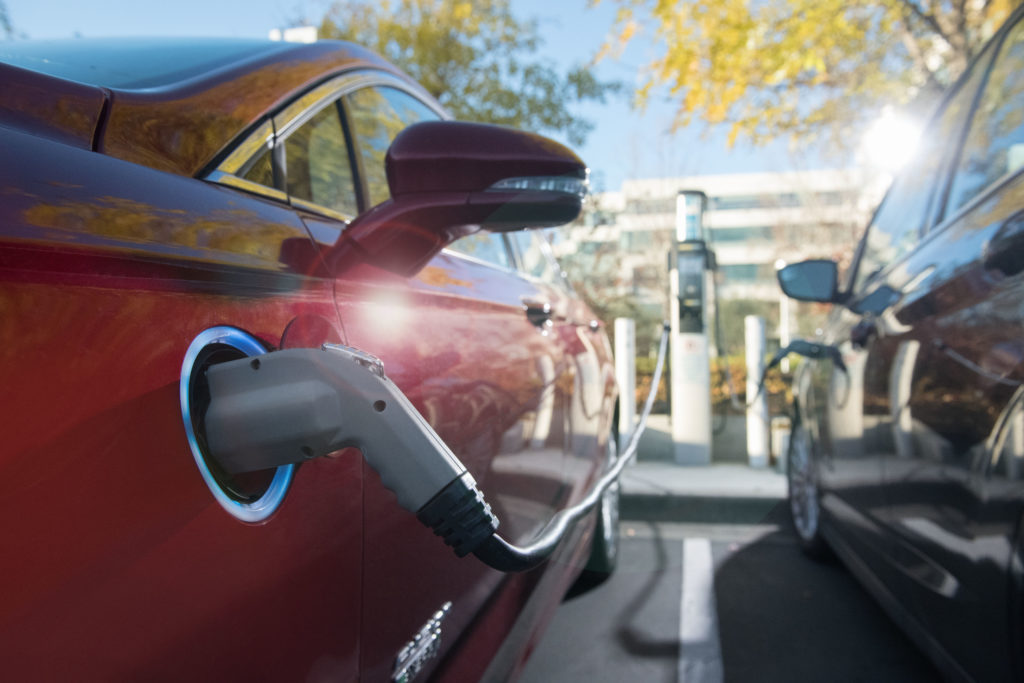PG&E aims to speed up electric vehicle ownership in California
SAN FRANCISCO — Partnering with business customers and electric vehicle (EV) charging companies, PG&E will install 7,500 EV chargers at condominiums, apartment buildings and workplaces across Northern and Central California, including at sites in disadvantaged communities.
Interested business customers can learn more and apply for Pacific Gas and Electric Company’s (PG&E) new EV Charge Network program at pge.com/evchargenetwork.
To date, more than 500 customers have expressed interest in the program. In the first quarter of 2018, PG&E will begin installing new EV chargers in partnership with business customers, including at the first participating customer, Merced College.
“We are committed to doing our part to reduce greenhouse-gas emissions in California and also look forward to providing increased access for future electric vehicle users,” said Joe Allison, Vice President of Administrative Services at Merced College.
In California, transportation is the single largest contributor to greenhouse-gas emissions. Expanding access to EVs can increase clean air and reduce greenhouse-gas emissions in the state. The electricity fueling EVs in California comes from one of the cleanest energy mixes in the country – nearly 70 percent of the electricity PG&E delivers to customers is from greenhouse gas-free resources.
While EV adoption continues to grow in California, one of the biggest barriers remains – the lack of available places to charge. PG&E’s EV Charge Network will support the adoption of EVs by increasing access to charging in locations where it has traditionally been limited and where cars often sit for longer periods of time, like workplaces and apartment buildings.
“California continues to lead the nation in the fight against climate change and clean transportation is critical to building our sustainable energy future,” said Geisha Williams, CEO and President of PG&E Corporation.
PG&E’s EV Charge Network program will pay for and build the infrastructure from the electric grid to the charger. Additionally, PG&E will offset a portion of the charger cost for all participating customers, based on the site and location.
Details of the program include:
- Partnering with EV charging companies, PG&E will install 7,500 level 2 charging stations at business customer sites including condominiums, apartment buildings and workplaces across Northern and Central California.
- To increase EV charging access to more customers, at least 15 percent of the chargers will be installed in disadvantaged communities.
- The three-year program officially starts in 2018, and continues through 2020, with a budget of $130 million.
- All site hosts can choose to own their charging equipment. PG&E can own and maintain up to 35 percent of the total (up to 2,625 out of 7,500) at workplaces in disadvantaged communities and apartment buildings or condominiums.
- Customer sites can choose chargers from a list of pre-qualified vendors that meet quality and safety standards. A list of the pre-qualified vendors can be found here.
Supporting EV Adoption
Committed to increasing adoption of clean vehicles in the state, PG&E continues its efforts to make it easier for customers to make the switch to EVs. Online resources help customers driving EVs learn more and determine which rate plan makes sense for them. On PG&E’s residential EV rate plans, customers pay the equivalent of $1.20 per gallon to charge their vehicle overnight.
EV drivers who are PG&E residential electric customers can apply for the Clean Fuel Rebate, a one-time rebate of $500 rewarding them for using electricity as a clean transportation fuel. The rebate is part of California’s statewide Low Carbon Fuel Standard initiative, which aims to reduce transportation-related greenhouse-gas emissions by encouraging the adoption of clean fuels like electricity.
Also, PG&E has proposed additional projects to the California Public Utilities Commission that, if approved, will further accelerate EV adoption and combat climate change. Projects include deployment of fast-charging stations to meet consumer demand as well as electrification for fleets with medium- and heavy-duty vehicles including school buses, transit agencies and delivery fleets that often use diesel, a highly polluting fuel.
To learn more about the EV Charge Network program, watch an overview video here and visit our website at pge.com/evchargenetwork. To learn more about other options for EV drivers, visit pge.com/ev.


